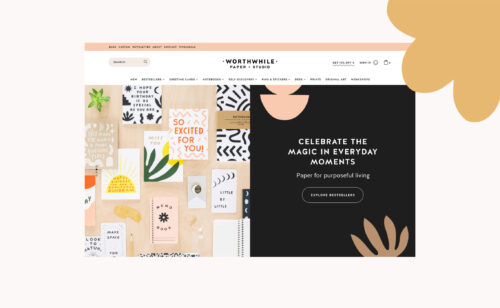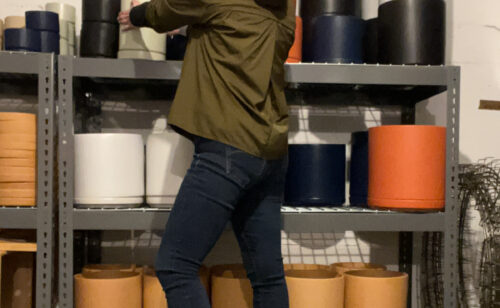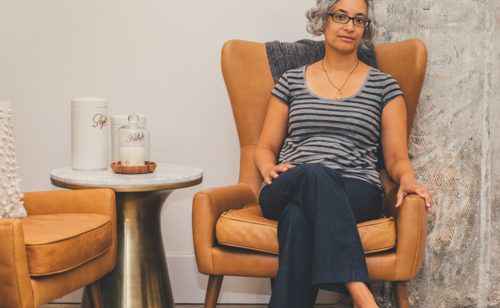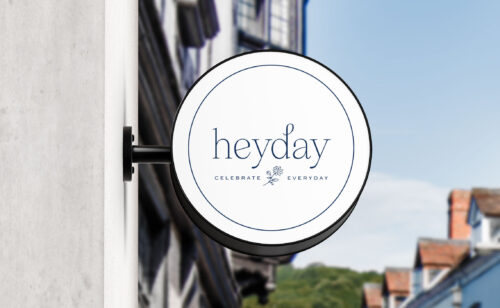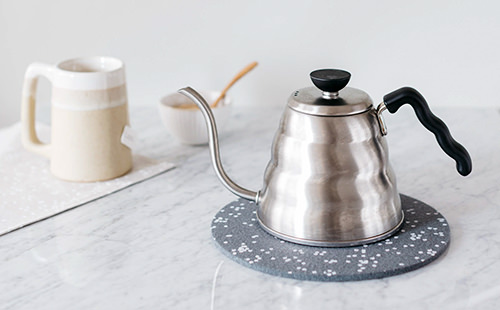
I’m happy to introduce Erin Dollar, a designer I’ve admired for a long time! She’s here to share behind the scenes of growing a textile business, creating multiple income streams, and partnering with other businesses to grow her brand.
My interview with Erin follows. Text in bold is me, answers to the bolded questions are Erin. Here we go!
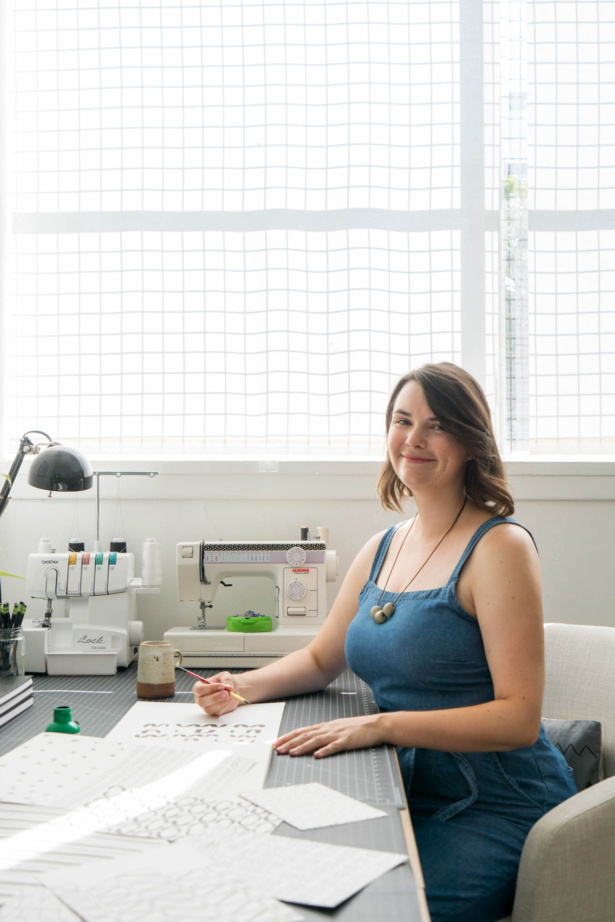
What do you create and what makes it so special?
I’m the designer behind Cotton & Flax, a collection of modern handmade home decor featuring my original pattern designs. I create pillows, tea towels, coasters, and other decor and gift items, with a focus on natural materials and low-waste production practices. I aim to create beautiful home decor that’s gentle on the environment.
My patterns begin as ink drawings, and I focus on creating minimal patterns with that perfect level of handmade, wabi-sabi imperfection, which adds charm to your living spaces. My fabrics are special because they are high-quality natural fibers, and each piece is hand silkscreen printed in studio, which makes for a stunning piece of utilitarian textile art. I’ve recently started partnering with other companies to license my designs, like my first fabric collection with Robert Kaufman, which debuted this summer.
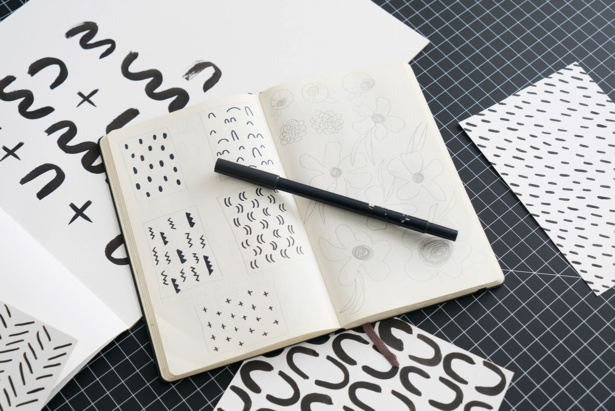
How long have you been in business? What can you pinpoint as a turning point to your business’ popularity? What propelled you forward and how did you know you’d “made it?”
I’ve been in business for five years. I think the turning point was really in year two, when I finally had a grip on how to market my products, and partnered with some talented photographers to execute that vision. Ira Glass describes the frustrating state that lots of creative people face, when your vision doesn’t match the outcome of your creative pursuits. It wasn’t until I started collaborating with more photographers, stylists, and designers that my vision for Cotton & Flax started to match what I imagined it could be. I knew the business was working when I started to see my work featured on blogs and in magazines. Having my work recognized in that way was very encouraging!
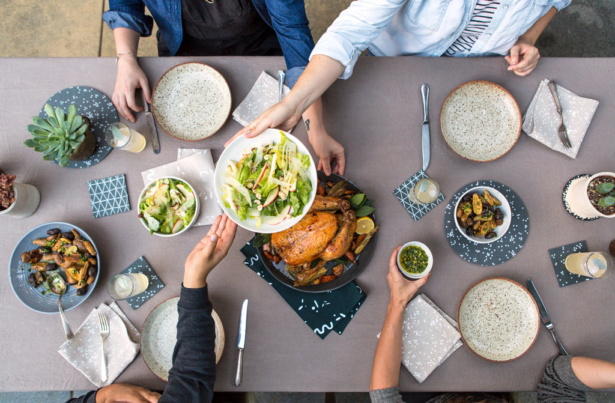
Is your product entirely handmade? Could you describe who makes your product and how? How has that changed over the life of your business?
All my products begin as pattern sketches and handmade prototypes. I draw each pattern by hand using a brush and sumi ink, which give my patterns their unique look. Production for Cotton & Flax is often handled by me in my studio — I still print all the fabrics myself, and manufacture the coasters, trivets, and some of the tea towels in house.
Now that I sell to dozens of retailers, and my product range has gotten more diverse, I have production partners who help me finish certain products. I have wonderful sewers in LA who take my printed fabrics and turn them into pillows and tea towels, I partner with Scout Books in Portland to create the patterned notebooks, and I collaborate with local small business owners to create the leather keychains (Deakin Handmade) and sachets (Minor Thread).
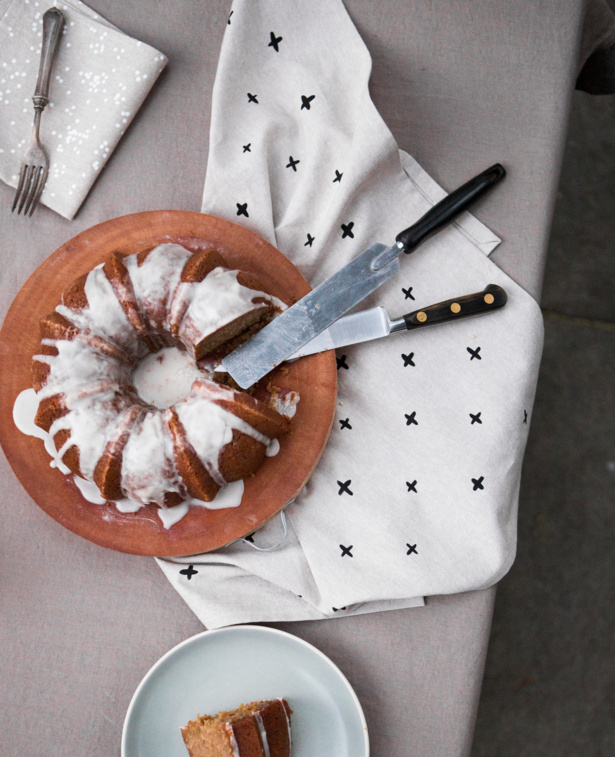
How have you found production partners, and what have you learned from the experience?
I’ve found most of my production partners through word of mouth, and talking with other textile designers. Some designers are happy to share their production partners and sources, because it means sending more support to a vital partner of their business. Living in Los Angeles, which has a large manufacturing sector, it’s been relatively easy to find the supplies and production partners I need for my business. Even so, it’s been so important to have a firm understanding of my profit margins, so I can decide what products make sense to put into production, and how outsourcing can fit into that plan.
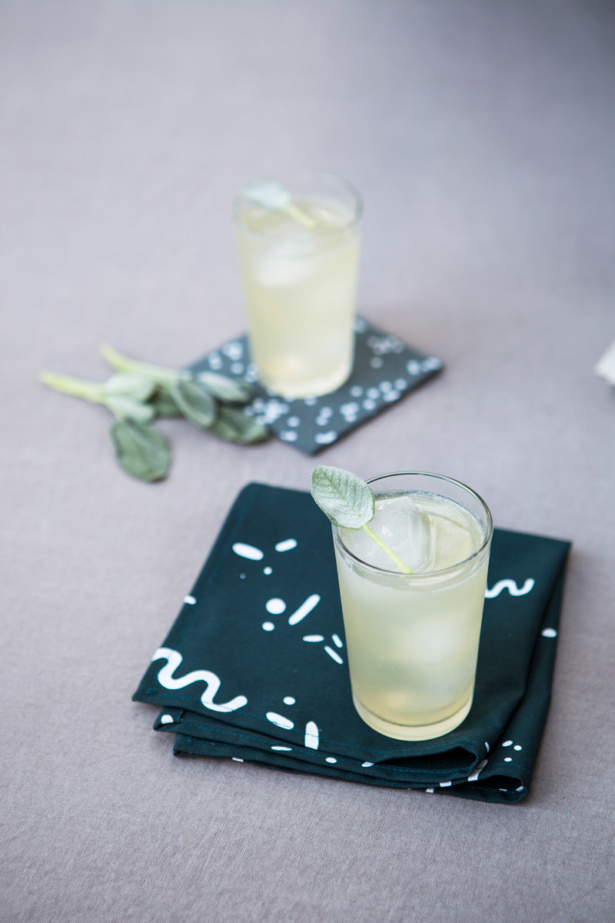
I know you balance your business with multiple revenue streams: wholesale, retail, workshops, and consulting. Could you share a bit about how that works, and why you would recommend diversifying like this?
I love having multiple income streams, because I naturally have a lot of interests, and having lots of different projects keeps me from getting bored with my work. I love the way that my retail and wholesale business feeds into my work as a creative educator! Sometimes my customers will learn more about my work, and want to learn more about printmaking or pattern design by taking a workshop with me. Sharing my passions with others through teaching has been a great way to keep things feeling fresh in the studio.
Similarly, the consulting and education I do for other small business owners is my way of connecting with the creative business community, and sharing what’s worked for me in running Cotton & Flax. Running a creative small business can feel really isolating at times—you spend your days in the studio, or fulfilling online orders, and you often don’t have a lot of people to bounce ideas off of, or get advice from. By partnering with CreativeLive, as well as speaking at conferences and doing interviews like this one, I hope to connect with other creatives, and form a supportive network that will boost all of our businesses.
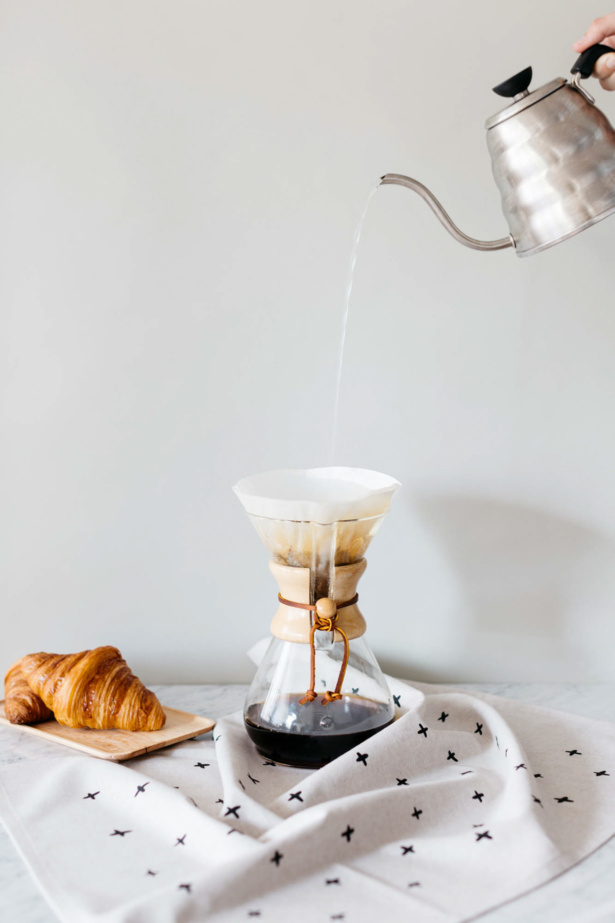
You have worked with retailers large and small. Do you see a big difference between working with chain stores, such as West Elm, and independent stores, such as Rare Device? How have these relationships shaped your business?
I love working with my retail shop partners! The majority of the shops that I work with are independent stores, often run by just a handful of people. These shop owners truly amaze me with their incredible dedication to supporting designers and sharing their love of handmade pieces. Developing great relationships with my stockists is very important to me, and it all comes down to communication. Keeping them informed about turnaround time, product updates, and what they can expect from you makes that working relationship a lot smoother.
With larger stores, like West Elm or CB2, there are a lot more hoops to jump through in terms of onboarding and production, but the reach is incredible! Having lots of eyeballs on your work can be incredibly beneficial, and many of the larger retailers are eager to partner with up and coming brands. It’s all about finding the right fit, and making sure that expectations are clear from the get go.
Where do you promote your work most? How do you sell it? How much time do you spend on marketing or promotional work?
I love using social media to keep in touch with my customers, and that’s my biggest go-to in terms of marketing my work for Cotton & Flax. I try to take a pretty relatable and authentic approach to selling my products; I try to highlight the things that set my work apart, and share with a group of people who value handmade work. I haven’t done traditional advertising so far, but I do everything I can to share what I’m doing with editors from magazines, blogs, and other influential spaces, and I’ve been lucky to receive some coverage from those efforts. Each year I try to refine my marketing process—everything seems to change so quickly these days, with the growth of new social media networks and new ways of sharing your work with the world.
What do you like about how you sell your goods? What about your selling process is not ideal for you?
One of the things I’ve debated over the last year is whether to open a retail space for Cotton & Flax. It’s one of the natural next steps for a business like mine, but the financial commitment and level of management required has been somewhat unappealing to me. Cotton & Flax is primarily an online retail business, which means I miss out on organic traffic of people walking into a physical retail space. For now, I’m satisfied with relying on my retail partners, who carry my work in their shops, to fill that role in my marketing plan. Someday I may be ready to expand into my own retail space, but for now, lower overhead is still a priority.
Is your business financially sustainable?
For the foreseeable future, yes! As I continue to grow Cotton & Flax, I hope that revenue will continue to increase, and that I’ll be able to continue my journey as an artist and a product designer. My worries are likely the same ones that other business owners face—what happens if I get sick or injured, or if I want to take time away from the business to have children? I’d love to see changes on a public policy level that would help create a safety net for small business owners, and encourage more people to take this path.
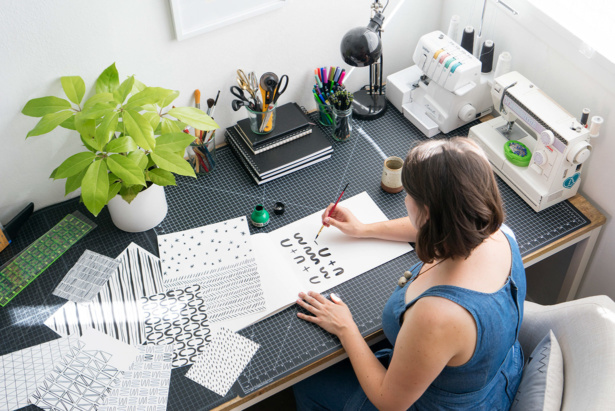
How do you see your business growing in the next few years? Do you intentionally keep it a certain size? Would you like to expand? If so, how?
In the next few years, I plan to focus more on pattern designs and licensing my creative work. I love working on large-scale projects, and I’ve found that collaboration has been the key to taking on projects that are bigger than what I can handle on my own. Licensing and collaboration are going to be my priority as I continue to grow Cotton & Flax.
What advice or encouragement would you give to other handmakers about getting help in a way that feels organic, and not a betrayal to their values?
It’s easy to forget this amongst all of the other considerations of running a business, but I try to remind myself all the time: there are no rules, and you can create your own path. It’s so important to check in with yourself as you build and sustain your business, to examine your reasons behind what you’re doing. Knowing your “why” behind your business can fuel your creativity, as well as your ability to make choices that stay true to your values. In Cotton & Flax’s case, my love of natural materials, and dedication to ethical manufacturing led me to find partners who create beautiful natural materials, and production partners who live close to my studio, with similar values of sustainability.
I always advise creative business owners to find mentors or advisors who really understand your priorities and values, and turn to them during good times, and during times of stress for support. That network of support can make all the difference.
Visit Erin’s website here, and snap up some of her designs: Cotton & Flax
Would you like support to grow your business?
Join our community of creative business owners like Erin! We always have someone around to answer tricky questions, clarify something that’s new to you, or help with your best next step. Enter your email address below for your invite to our private Facebook group and get my best tips for reaching the next level with your business via email:
Browse Posts
A Newsletter That Goes Beyond Shopify 101
It’s easy to find beginner info about ecommerce online. If you’re past that? Subscribe to our newsletter for advanced strategies and need-to-know info for established shops.
Learn how the top shops grow:
"*" indicates required fields
Related Posts
Let's take your online shop to the next level
The Shopify websites we design have a reputation for substantial improvements to ecommerce conversion rates and online sales. Let's talk!
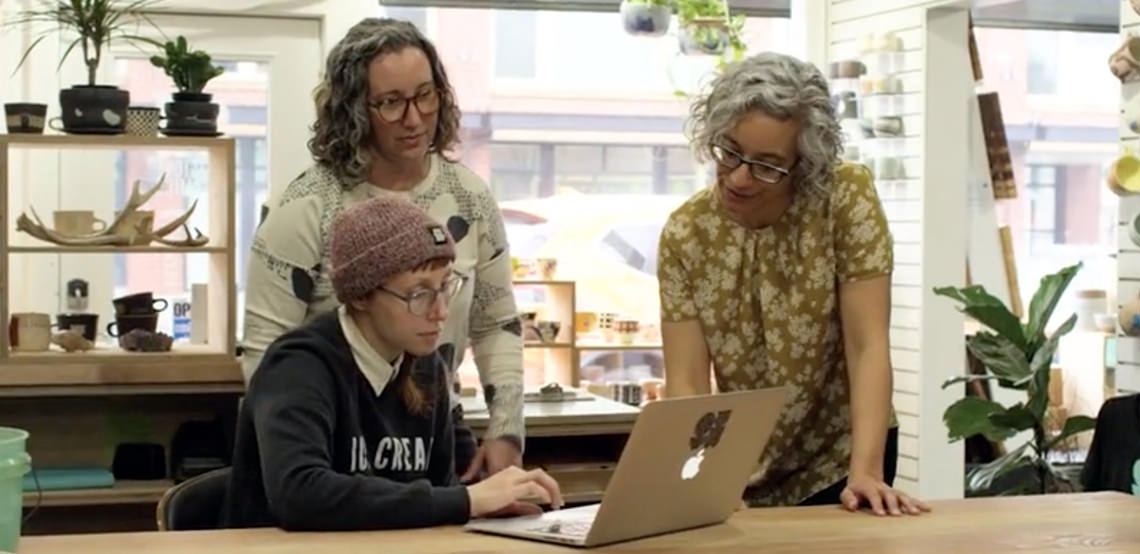 Grab my guide to the 10 main ways to grow traffic and optimize to boost sales.
Grab my guide to the 10 main ways to grow traffic and optimize to boost sales.